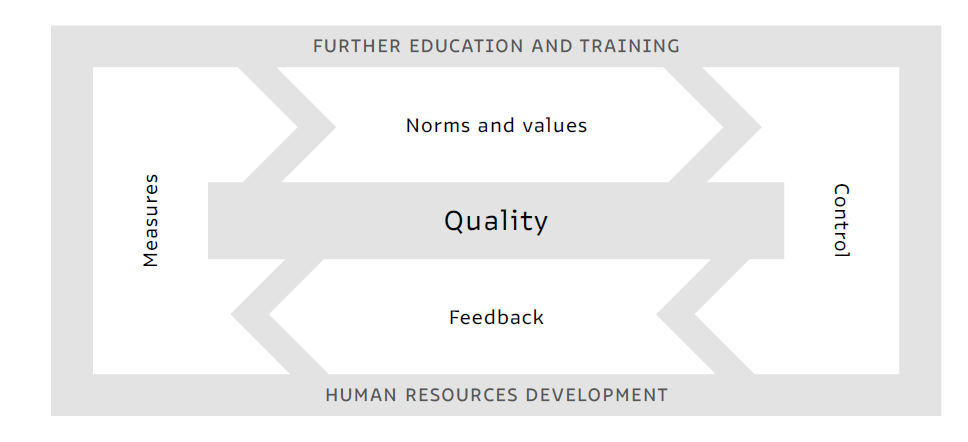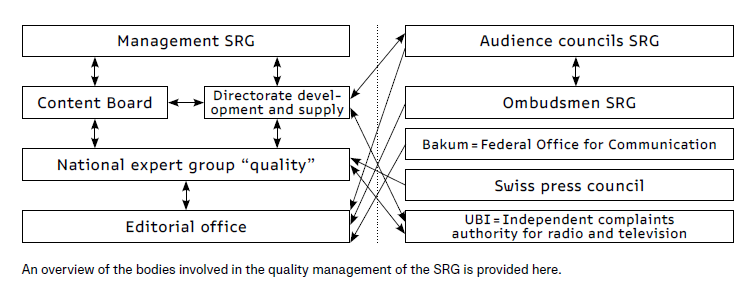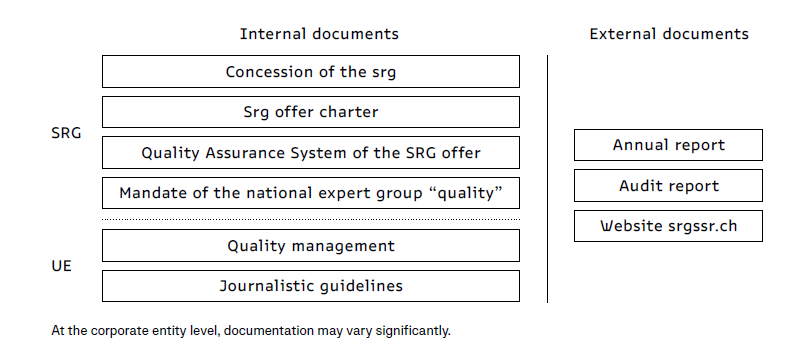Back to overview
Julien Winkelmann
Quality Assurance in the SRG

The journalistic quality of the Swiss Public Service Broadcaster, SRG results from the sum of defined, definable, and indefinable elements.
Defined elements: Relevance, professionalism, independence, diversity, and accessibility are the qualitative and ethical criteria specified for the SRG in accordance with Article 4 of the license. They are binding. All SRG content must meet these requirements.
Definable elements: The SRG is obliged to take quality criteria into account when carrying out its activities but can define these itself. The opinion and assessment of the experts are decisive for the definition of these criteria. For example, the SRG understands the general term "diversity" in a way that the programme and productions are tailored to the different population groups living in our country today, especially regarding age, gender, level of education, socio-economic background, and ethnic origin. Consequently, the offer must consist of a range of content of the most diverse genres and formats and reflect the broadest possible spectrum of opinions. The quality criteria influence SRG's corporate and offering strategy as well as SRG's offering charter and the journalistic guidelines of the SRG Enterprise Units (RSI, RTR, RTS, SRF, SWI). In addition, the Quality Assurance System of the SRG offering ensures that these criteria are met thanks to regional implementation.
Non-definable elements: Even if the SRG cannot influence them, the non-definable elements are decisive for the market success of its offer. On the one hand, there are cultural as well as vector-specific differences. What is rated as "good" in German-speaking Switzerland is not necessarily equally well received in French-speaking Switzerland. The cultural context in which the media operate can vary. It also has a formative effect. The same applies to vectors. If something is "well received" on television, this does not necessarily mean that it will automatically be equally well received on the radio. The criterion "current", for example, is much more important for online news than for news on television. The media condition the audience. The decisive factor here is public opinion, which can be evaluated with surveys and usage measurements. In addition to the indefinable elements mentioned, there is a "subjective residual value". Journalistic products are not industrially produced on an assembly line. To a certain extent, they are the result of creative processes and are often evaluated completely unsystematically. Some programmes go "viral", whilst others miss their audience and are hardly noticed. Here, the perspective of the audience is crucial, which can be determined with usage measurements and interviews. The concept of "programme quality" is complex: the perception of the content by the professionals who produce it, the perception of the audience and that of other players such as BAKOM, the supervisory authority which checks compliance with the SRG license, have a decisive influence. The quality management of SRG offerings does not consider all these dimensions but concentrates exclusively on the perspective of the professionals involved in the production of content. To this end, SRG assures the quality of its offerings in various ways: The Market and Audience Research department of DG SRG enables a more global view through the audience's perception of the offering, and the Public Value project examines quality from the point of view of legitimacy. Quality management of the SRG offering is the responsibility of each individual SRG enterprise unit whose editorial teams produce content. At DG SRG, the quality dossier lies with the Development and Supply Directorate, which primarily coordinates the work in the Enterprise Units via the national "Quality" specialist group (cf. SRG Executive Board decision 10/2018). The quality management, which is specifically designed in the Quality Assurance System, consists of a series of internal controls and instruments with which the conformity of the offer and the above-mentioned criteria is checked. This is done in a circular and iterative process over four phases:

A central coordination unit ensures and checks that the corporate units apply and comply with the principles. This considers the specifics of the respective business unit. If necessary, the principles are adapted and laid down in supplementary regulations. The enterprise units are free to define their own editorial guidelines which are better suited to the cultural environment of their region. The Quality Assurance System of the SRG offering is only one of the elements that make up enterprise-wide quality management. Practically all areas of our media organization contribute to quality. Technology, administration, finance and human resources and training enable the editorial teams to prepare and offer a service of the desired or required quality. Each corporate unit appoints a quality manager who is responsible for internal controls and further development. The quality managers meet regularly to exchange experience and knowledge on quality standards within the framework of the national "Quality" expert group. The task of the expert group is to make concrete the requirements of the supervisory authority according to Article 4 of the license, to continuously improve the Quality Assurance System and to align its standards with the media science findings recognised in Switzerland and abroad. The mandate of the expert group formally defines its areas of competence. The quality officer of DG SRG (Directorate Development and Supply) is responsible for the coordination and back office of this body. From a governance point of view, the panel reports to both the Content Board, the highest body for interregional cooperation for everything editorial, and the Development and Supply Directorate, which has a budget for national projects. It should be noted that interregional bodies such as the Conference of Editors-in-Chief (CRK), which are represented on the Content Board, can contribute their expertise to the projects of the "Quality" specialist group. The SRG Executive Board, as the highest decision-making body of the enterprise, is the superordinate level. It approves the decisions of the Content Board, which also affects the work of the specialist group. Furthermore, certain projects of the specialist group (e. g. SRG charter of offerings) require the approval of the SRG board of directors as the highest authority of the group. Even if the quality management of the SRG offering is primarily controlled via internal processes, the quality officers and editorial teams of the Enterprise Units take into account the observations and the handling of complaints by the Audience Council and the SRG ombudsman's offices, both bodies of the operating authority. The quality manager of DG SRG also maintains close contact with the presidents of the audience council, with whom he exchanges views regularly. It goes without saying that BAKOM's expectations are considered. To promote dialogue and maintain a constructive exchange, formal and informal meetings are held regularly between BAKOM representatives and the quality manager of DG SRG or members of the national "Quality" specialist group.

Article 4 of the license requires that external experts periodically monitor the
SRG's Quality Assurance System. For the years 2020-22, the Zurich University
of Applied Sciences (ZHAW) was entrusted with this task. It was selected from
several organisations active in auditing the quality management of private
broadcasters. The audits were carried out at several UE editorial units and
focused primarily on the relevance and effectiveness of the Quality Assurance
System. Fortunately, the results of the audit reports were consistently positive
or very positive. The recommendations of the reports, which aim at a continuous
improvement of the quality processes at SRG, were implemented year
after year by all quality managers in the respective UE. Following a new call
for tenders for the years 2024, 2026 and 2028 the audits will now be carried
out every two years. The University of Applied Sciences Graubünden (FHGR)
was selected to carry out the future audits and possibly confirm the previous
results. The "Yearbook Quality of the Media" published by the Research Centre
Public and Society (fög) at the University of Zurich serves as a reference for all
SRG business units and most Swiss media organisations in terms of in-depth
analysis of the quality of information offerings. Even if the concept of quality is to be considered rather politically (contribution
to democracy and the formation of opinion), the study is an important source
for those responsible for quality to keep their academic knowledge in the field
of media quality up to date. In order to fulfil their tasks and develop further, the
editorial offices take into account other studies which BAKOM commissions
from time to time to shed more specific light on the quality of the offering. As
stipulated in the charter, the activities and results of the SRG's internal quality
controls must be reported annually in the SRG annual report in the "Quality"
chapter. The annual report is available on the group's website: www.srgssr.ch.
The results of the quality audits are also reported on this platform (on a specific
page dedicated to quality). The documentation on the quality management of
the SRG offering has been organised more systematically in recent years and
the content has been summarised, which provides more clarity and order. For
information purposes, the hierarchy of documents is shown here:




 The journalistic quality of the Swiss Public Service Broadcaster, SRG results from the sum of defined, definable, and indefinable elements.
The journalistic quality of the Swiss Public Service Broadcaster, SRG results from the sum of defined, definable, and indefinable elements.

